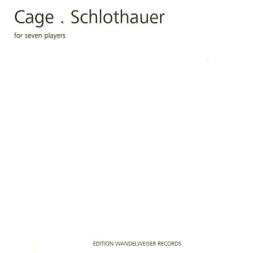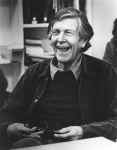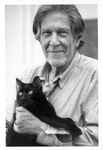Cage Schlothauer - For Seven Players
Download
Filename: cage-schlothauer-for-seven-players.zip- MP3 size: 10.8 mb
- FLAC size: 83.8 mb
Table of Contents
Tracks
| Track | Duration | Preview |
|---|---|---|
| 15 Similar Events - Septet | 36:36 | |
| Seven | 20:04 |
Images

Catalog Numbers
EWR 0604Labels
Edition Wandelweiser RecordsListen online
- online anhören
- online luisteren
- ouvir online
- écouter en ligne
- lyssna på nätet
- ascolta in linea
- lytte på nettet
- escuchar en línea
- kuunnella verkossa
Formats
- CD
- Album
Companies
| Role | Company |
|---|---|
| Recorded At | On Air Studio |
| Printed By | Heinendruck GmbH |
| Designed At | Mess Media, Berlin |
Credits
| Role | Credit |
|---|---|
| Cello | Marcus Kaiser |
| Clarinet | Ulrich Krieger |
| Composed By | Burkhard Schlothauer (tracks: 2), John Cage (tracks: 1) |
| Executive-Producer | Antoine Beuger |
| Flute | Normisa Pereira da Silva |
| Layout | Daniel Bechem |
| Percussion | Tobias Liebezeit |
| Piano | Guy Vandromme |
| Producer | Ahmed Chouraqui, Burkhard Schlothauer |
| Viola | Julia Eckhardt |
| Violin | Burkhard Schlothauer |
Notes
- Recorded: On Air Studio Berlin-Kreuzberg 2002
- Layout: Mess Media, Berlin
- Printed by: Heinen Druck, Düsseldorf
- Made in Germany
- Packaged in a gatefold cardboard sleeve
Barcodes
- Barcode (Text): 4 011778 041504
- Barcode (String): 4011778041504
- Rights Society: GEMA
- Label Code: LC 02174
- Other: ISRC: DE-G72-96604 01-02
About Cage Schlothauer






John Cage (born September 5, 1912, Los Angeles, California, USA - died August 12, 1992, New York City, New York, USA) was an American composer, music theorist, writer, philosopher, and artist. He is best known and lauded as a pioneer of post-war avant-garde composition.
He left Pomona College early to travel in Europe (1930-31), then studied with in New York (1933-4) and in Los Angeles (1934): his first published compositions, in a rigorous atonal system of his own, date from this period. In 1937 he moved to Seattle to work as a dance accompanist, and there in 1938 he founded a percussion orchestra; his music now concerned with filling units of time with ostinatos (First Construction in Metal, 1939). He also began to use electronic devices (variable-speed turntables in Imaginary Landscape n.1, 1939) and invented the 'prepared piano', which involves placing a variety of objects between the strings of a grand piano in order to create an effective percussion orchestra under the control of two hands.
He moved to San Francisco in 1939, to Chicago in 1941 and back to New York in 1942, all the time writing music for dance companies (notably for with whom he formed a lifelong relationship), nearly always for prepared piano or percussion ensemble. There were also major concert works for the new instrument: A Book of Music (1944) and Three Dances (1945) for two prepared pianos, and the Sonatas and Interludes (1948) for one. During this period Cage became interested in Eastern philosophies, especially in Zen.
Working to remove creative choice from composition, he used coin tosses to determine events (Music of Changes for piano, 1951), wrote for 12 radios (Imaginary Landscape n.4, also 1951) and introduced other indeterminate techniques. His 4'33" (1952) has no composed sound -- only that of the environment in which it is performed; the Concert for Piano and Orchestra (1958) is an encyclopedia of indeterminate notations. Yet other works show his growing interest in the theatre of musical performance (Water Music, 1952, for pianist with a variety of non-standard equipment) and in electronics (Imaginary Landscape n.5 for randomly mixed recordings, 1952; Cartridge Music for small sounds amplified in live performance, 1960), culminating in various large-scale events staged as jamborees of haphazardness (HPSCHD for harpsichords, tapes etc, 1969). The later output is various, including indeterminate works, others fully notated within a very limited range of material, and pieces for natural resources (plants, shells).
Cage appeared widely in Europe and the USA as a lecturer and performer, having an enormous influence on younger musicians and artists.
He was married to from 1935 until their divorce in 1945.
Real Name
- John Milton Cage
- Jr.
Name Vars
- Cage
- J. Cage
- J.Cage
- JC
- John John Cage
- Johnny Cage
- Джон Кейдж
Related albums
Top Albums
The Jam - Greatest Hits
Austin Lucas - Two Songs
Barbara Zoschke - Hier Kommt Ponyfee Die Reise Zur Wolkenfee
David Bromberg Band - Reckless Abandon Bandit In A Bathing Suit

Micro - 25th Year Micro Rock Lek Lek
Various - The Best Of X Tra Records
Aufklärung - Di La TempestaLOscuro Piacere
W B Yeats Jim Norton, Denys Hawthorne, Nicholas Boulton And Marcella Riordan - The Great Poets
Ültra Raptör - Ültra Raptör
Eddie Hubbard - Do Do Something One Kind Word
上野洋子 - Yk20 20周年につき初ソロaudio
Bloodnote, Megalodon , Mourning Souls - Experimental Noise Grind Split
